Well here at last, dear friends, on the eve of a new year, comes the end of our Fellowship of the Ring re-read here at The Fandomentals. Go in peace! I will not say: do not weep, though you probably shouldn’t, because we’ll start The Two Towers in January and the stakes are very, very low.
“The Breaking of the Fellowship” is a bold way to end a book, even if it’s in keeping with the tone and themes of all that’s preceded it. It’s often dark, chaotic, and blunt. The Fellowship falls apart almost effortlessly, as if it had been held together by only the thinnest of strings without anyone having realized it before it snapped. Boromir breaks, Frodo flees, and the company dissolves into chaos.
There was a sense of control over movement in most of The Fellowship of the Ring. Once they got their mission, Frodo and Company made their way to Rivendell, with some colorful pit stops along the way. After picking up some sidekicks at the Last Homely House, the Fellowship made their way methodically south, over the Misty Mountains, through Lórien, down the Anduin to Rauros. There was a sense of purpose, of direction, that the characters were deciding where to go and how to get there. “The Breaking of the Fellowship” removes that control. Even the title of the chapter implies it: “The Breaking of the Fellowship” quietly seems to suggest that the breaking was done to them, the act of some unnamed, outside force.
But at its core, “The Breaking of the Fellowship” comes down to its characters’ choices, and how these choices reflect the tension between their sense of self and the outside world.
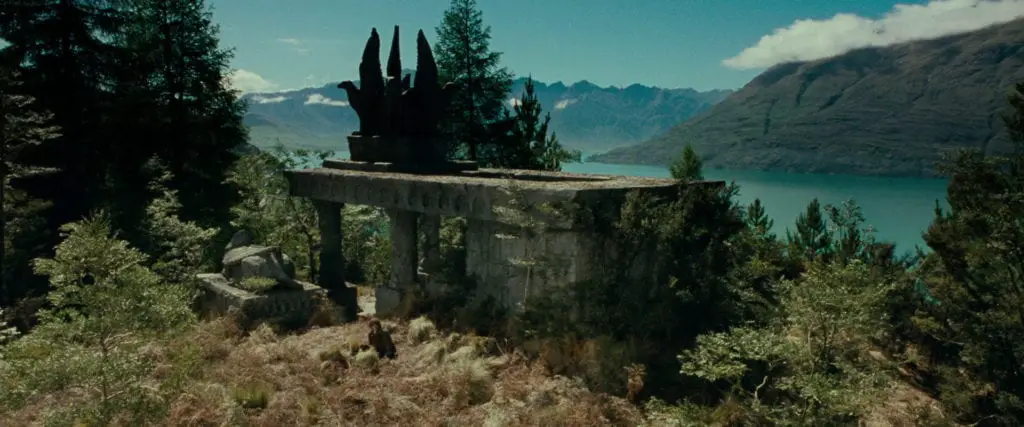
Good, Evil, and the Sense of Self
Tolkien is often given an bad rap because of his villains. They’re portrayed as flat, one-dimensional, ultimate evil, all that. And that’s fair enough, if you assume that Tolkien is writing a story of Good vs. Evil. But I’d argue that this is a drastic misreading of The Lord of the Rings, and it’s something that I’m going to come back to again and again as we move through The Two Towers and The Return of the King. Lord of the Rings doesn’t have villains, at least not ones that matter to the story. Sauron is an abstraction: he’s a notion and a threat that tests characters, he’s not a character himself. Characters hold themselves together in the face of this threat or they don’t: and that makes for a much more emotionally and psychologically complex book that Tolkien is often given credit for writing.
The manner of this temptation varies, but it invariably involves an individual evaluating their relationship with the rest of the world. So far we’ve seen Gandalf resist temptation. We’ve seen Galadriel hold onto her sense of self in the face of near-limitless power (and break a very long cycle of destruction). Both see the Ring as a potential tool to do a great deal of good in the world, a potential strategic step that would allow them to remake the world in the image they deemed most fit.
They both rejected it: they chose to remain themselves (Galadriel says this explicitly) rather than extending themselves and imposing themselves upon the world. It is the opposite of this – the rejection of the good in the name of some distant end, in the name of expediency – that causes the real problems in The Lord of the Rings and that is the source of all the evil that takes place in the actual narrative of the book.
And that brings us, of course, to Boromir.
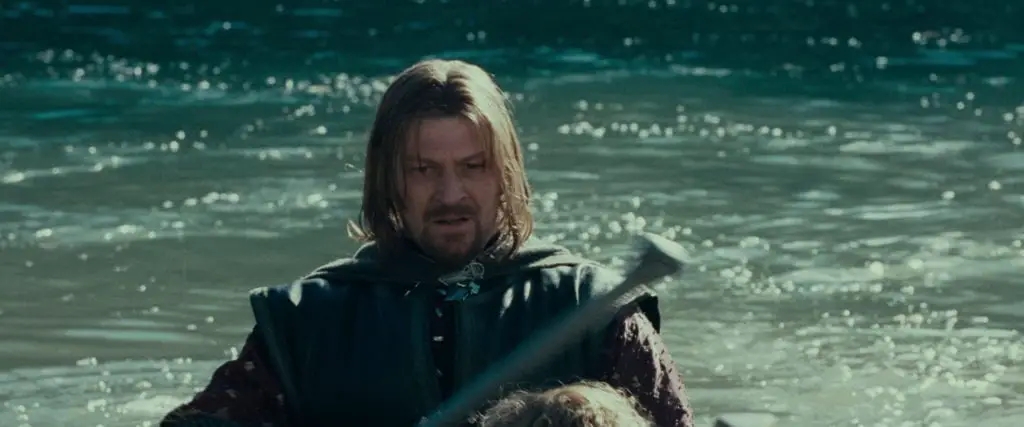
Boromir
Poor Boromir. By most accounts, Boromir is a pretty Good Person™. He’s known as a good brother to little Faramir despite Denethor’s rather open neglect of his younger son. He risked his life on multiple occasions to protect the people of Minas Tirith and basically walked to Rivendell in the off chance that a dream of his and of Faramir’s would help in the city’s defense. He is respected by his people and the people of Rohan. He’s been a good companion to the Fellowship, and they would have been in trouble without him on Caradhras.
But Boromir fails, and his failure breaks up the fellowship.
Boromir’s surrender to the power of the Ring is rooted in a deft mixture of ruthless practicality, desire to do good for his people, and pride in both his land and in himself. It’s no secret that Boromir has always been rather prickly when it comes to perceived slights against Minas Tirith (just ask the Council of Elrond). It’s telling that the tone of their conversation turns as soon as Frodo expresses doubts about the abilities of Men:
“Against – well, if it must be said, against trust in the strength and truth of Men.”
“Yet that strength has long protected you far away in your little country, though you knew it not.”
“I do not doubt the valor of your people. But the world is changing. That walls of Minas Tirith may be strong, but they are not strong enough. If they fail, what then?”
“We shall fall in battle valiantly.”
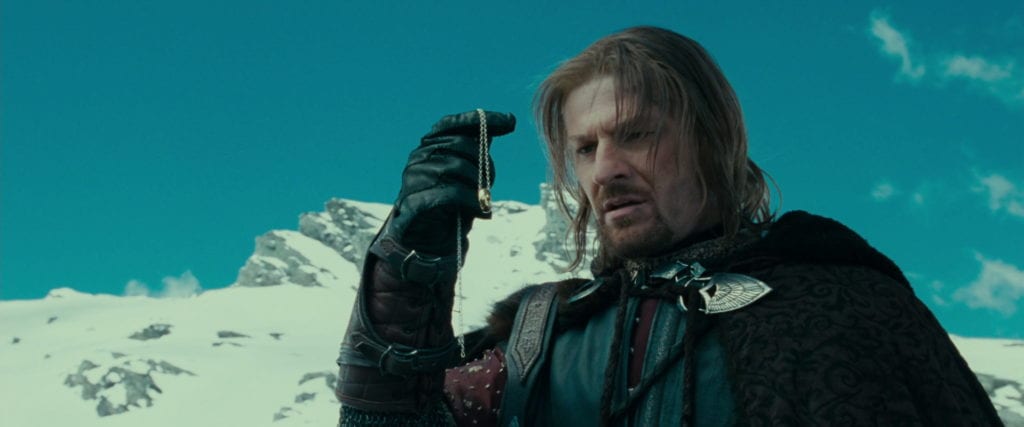 There is a stubborn optimism in Boromir that’s very appealing: he truly believes in human beings, and in capacity of his people to stand strong in the face of insurmountable evil. It’s hard to condemn him for that. Especially when, to a certain extent, he’s right. Frodo’s mission into Mordor is a desperate, wild shot in the dark. From a logical, strategic perspective, of course it makes more sense to Boromir to use the Ring to help his people. It is infuriating to him that after all the endless batterings taken by his city and his people, when a life raft finally appears, the powers above him order a tiny, defenseless hobbit to pilot it into the depths of the ocean.
There is a stubborn optimism in Boromir that’s very appealing: he truly believes in human beings, and in capacity of his people to stand strong in the face of insurmountable evil. It’s hard to condemn him for that. Especially when, to a certain extent, he’s right. Frodo’s mission into Mordor is a desperate, wild shot in the dark. From a logical, strategic perspective, of course it makes more sense to Boromir to use the Ring to help his people. It is infuriating to him that after all the endless batterings taken by his city and his people, when a life raft finally appears, the powers above him order a tiny, defenseless hobbit to pilot it into the depths of the ocean.
“It is by our own folly that the Enemy will defeat us,” cried Boromir. “How it angers me! Fool! Obstinate fool! Running willfully to death and ruining our cause.”
But we can’t give Boromir too much credit here for being pure of heart. His failure lies not so much in his blind optimism in the strength of men and of Minas Tirith as in his refusal to fully to acknowledge what the use of the Ring will mean. The mixture of these impulses, and Boromir’s inability to fully own up to what he wants, are beautifully on display in his monologue after Frodo tells him it would be impossible to use the Ring for good:
Gandalf, Elrond – all these folk have taught you to say so. For themselves they may be right. These elves and half-elves and wizards, they would come to grief perhaps. Yet often I doubt if they are wise and not merely timid. But each to his own kind. True-hearted Men, they will not be corrupted. We of Minas Tirith have been staunch through long years of trial. We do not desire the power of the wizard-lords, only the strength to defend ourselves, strength in a just cause. And behold! in our need chance brings to light the Ring of Power. It is a gift, I say; a gift to the foes of Mordor. It is mad not to use it, to use the power of the Enemy against him. The fearless, the ruthless, these alone will achieve victory. What could not a warrior do in this hour, a great leader? What could not Aragorn do? Or if he refuses, why not Boromir?
This is a wonderful speech. It starts out in typical Boromir fashion, with an outsized faith in the capacity of steely-hearted Gondor in the face of trouble. The Ring is their gift, a reward for all their suffering, bestowed upon their just cause. But near the end we get some inklings of trouble. Boromir declares that victory against Mordor will belong only to the fearless, and more worryingly, the “ruthless.” It will belong to those who dare to use the power of evil against evil. And gathering speed from there, the description of the Ring as a justifiable means to an end turns into a personal fantasy of power.
His talk dwelt on walls and weapons, the mustering of men; and he drew plans for great alliances and glorious victories to be; and he cast down Mordor, and became himself a mighty king, benevolent and wise.
It’s striking how closely the trajectory of Boromir’s rationalization parallels Galadriel’s. Both come from families with a long, proud history. Both face frightening and imminent destruction. Galadriel abnegates all of that in favor of keeping herself. Boromir refuses to let go of this, and instead loses who he is.
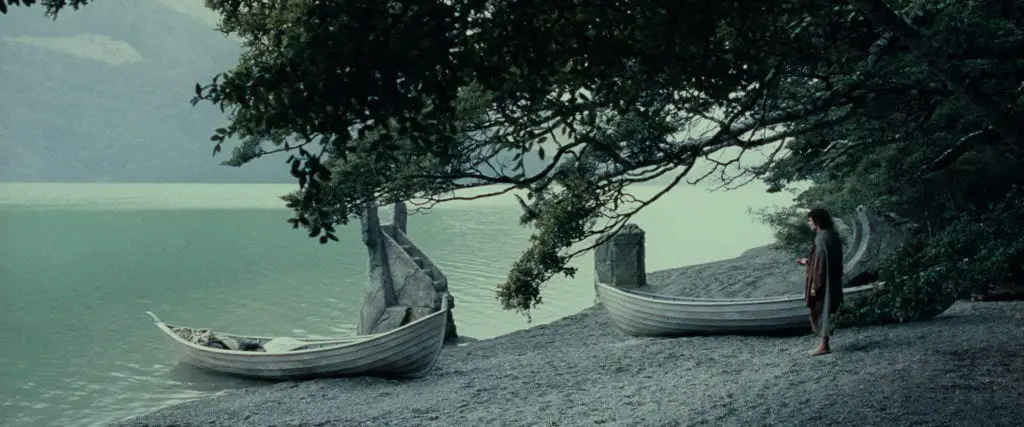
Frodo
Frodo is not tested by the Ring in quite the same way as Boromir, but our poor little protagonist has his own set of decisions to make. Where Boromir blusters, and obfuscates his own desires, Frodo is quietly self-aware.
“You say you are afraid. If it is so, the boldest should pardon you. But is it not really your good sense that revolts?”
“No, I am afraid,” said Frodo. “Simply afraid.”
Frodo never lies to himself and he is aware of the reality of his mission from the start. It’s what gave value to his choice, both here and at the Council of Elrond. This remarkable awareness sets him apart from Boromir more than nearly anything else, and it allows Frodo to hold onto himself despite bearing the burden of the Ring. It’s almost as if they’re at different places within the five stages of grief: Boromir bargains, Frodo flits between depression and acceptance.
And the depression is certainly there:
Against Minas Tirith was set another fortress, greater and more strong. Thither, eastward, unwilling his eye was drawn. It passed the ruined bridges of Osgiliath, the grinning gates of Minas Morgul, the haunted mountains, and it looked upon Gorgoroth, the valley of terror… then at last his gaze was held: wall upon wall, battlement upon battlement, black, immeasurably strong, mountain of iron, gate of steel, tower of adamant, he saw it: Barad-dûr, Fortress of Sauron. All hope left him.
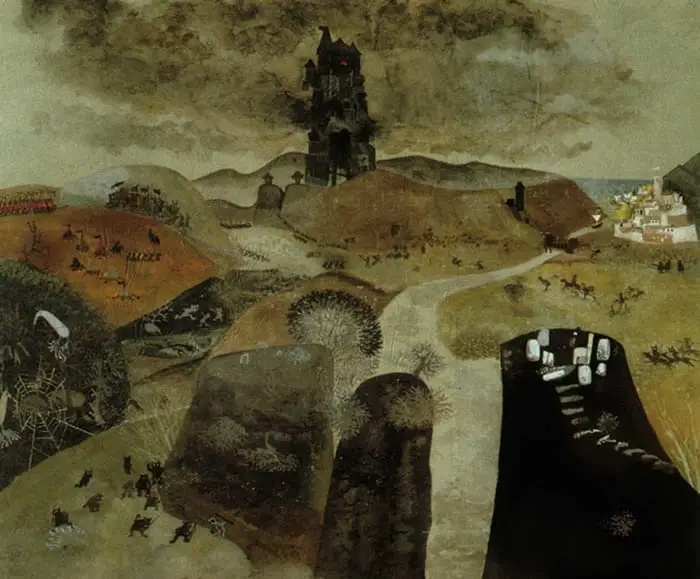
Self-awareness is valuable attribute in Tolkien’s worldview – it allows one to be aware of their weaknesses, and account for them. Of course, that doesn’t mean it makes life particularly easy. Frodo’s vision at Amon Hen as he’s wearing the Ring is impressive and awful. As a reader it’s one of the most wide-ranging views of Middle-earth that we’ve seen; for Frodo it’s as if the violence of the world sweeps over him, and goodness dims before the dreadful might of Barad-dûr.
And then suddenly he felt the Eye… He heard himself crying out Never, never! Or was it: Verily I come, I come to you? He could not tell. Then as a flash from some other point of power there came to his mind another thought: Take it off! Take it off! Fool, take it off! Take off the Ring! The two points strove in him. For a moment, perfectly balanced between their piercing points, he writhed, tormented. Suddenly he was aware of himself again. Frodo, neither the Voice nor the Eye: free to choose, and with one remaining instance in which to do so. He took the Ring off his finger.
This is such a fitting moment for Frodo to begin the rest of his quest. In the face of hopelessness and fear, bandied about by the larger forces of the world, he begins the last stage of his quest by holding onto himself, “free to choose.”
Samwise
And then there’s Sam.
Samwise Gamgee, once and future champion of ending Lord of the Rings books with a bang, really comes into his own in “The Breaking of the Fellowship.” The crowded cast and busy narrative of Book II had largely sidelined Sam but he here reveals himself to be – unsurprisingly to all that know and love him – as the most selfless and perceptive of the bunch.
Sam generally seems to have a good sense of himself, but he’s also operating on a much different plane than either Frodo or Boromir. Frodo is fixated on his duty to Middle-earth, Boromir is trying to find a way to protect his people. They are both large-scale endeavors. Sam, though, it worried about Frodo. He’s aware of how Frodo is feeling before Frodo himself even is, yet Sam is thoughtful enough to give him space, to let him think and figure out his feelings on his own.
Following from that is another point: Sam’s kindness to and understanding of Frodo is rooted in his respect for Frodo’s choice and autonomy. Compare him to Merry and Pippin. Merry and Pippin want to protect Frodo – they don’t want him to go to Mordor at all. Merry asks why the Fellowship can’t stop him, insisting it would be “mad and cruel” to let him go. Pippin agrees, saying that they “must” stop him. This is a perfectly reasonable way to react to your friend beginning a death march! But it’s also gliding past the problem that Frodo is actually facing. And it’s telling that when it’s revealed that Frodo’s gone missing, Merry and Pippin tear off into the woods to protect him, while Sam quickly realizes that Frodo will be heading back to the boats, ready to head off on his own.
Sam’s conversation with Frodo after he dives into the Anduin to prevent him from going to Mordor alone is one of the most touching parts of The Fellowship of the Ring.

“If I hadn’t a guessed right, where would you be now?”
“Safely on my way.”
“Safely!” said Sam. “All alone and without me to help you? I couldn’t have a borne it, it’d have been the death of me.”
“It would be the death of you to come with me, Sam,” said Frodo. “and I could not have borne that.”
“Not as certain as being left behind.”
“But I am going to Mordor.”
“I know that well enough, Mr. Frodo. Of course you are. And I’m coming with you.”
“Now Sam, “ said Frodo, “don’t hinder me! The others will be coming back at any minute. If they catch me here, I shall have to argue and explain, and I shall never have the heart or the chance to get off. But I must go at once. It’s the only way.”
“Of course it is,” answered Sam. “But not alone. I’m coming too, or neither of us isn’t going. I’ll knock holes in all the boats first.”
Frodo actually laughed. A sudden warmth and gladness touched his heart. “Leave one,” he said. “We’ll need it.”
It delights me how close this passage parallels “A Shortcut to Mushrooms.” In both chapters Frodo begins to drown in fear and doubt, and resolves to complete his mission alone, and minimize damage to those around him. In both of these cases he’s pulled back to the surface by Sam, who simply says that he’ll follow him. Their friendship is founded on so much respect for each other: they know each other very well, and they acknowledge the choices that each of them make. Look at the number of times in the above passage that Sam says a variety of “of course you are.” He’s validating Frodo’s choice, and then informing him of his own. Of course Frodo takes him along.
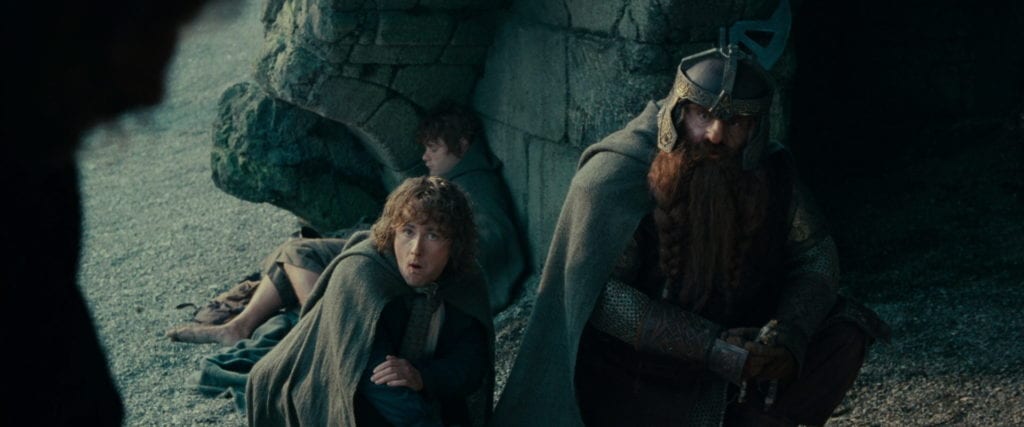
Final Points
- We’ll be talking a lot more about Tolkien’s concepts of good, evil, and the individual as we go one. But this brilliant essay is a great encapsulation of how I feel. Tolkien was a religious guy and would have been very aware of the different worldviews proposed by the ancient Manichaean sect as well as by early Catholic Church Father St. Augustine.
- “Whoa, Sam Gamgee,” he said aloud. “Your legs are too short, so use your head!” This was one of my favorite quotes from when my dad first read The Lord of the Rings to me when I was little.
- It’s intriguing to me how quickly the Fellowship falls apart, and how everyone dashing off into the woods is attributed to “a sudden madness.” This is not a great chapter for Aragorn, who finally makes a decision only to have the whole company disastrously scatter like thirty seconds later.
- A note on the timeline: it’s been two months since the Fellowship set out from Rivendell. They left on Christmas Day and broke up on the edge of Rauros on February 26th. Everything that happens for the rest of the series will take place in the next thirty days, which seems wild to me. The Ring is destroyed on March 25th.
- Prose Prize: I’m pretty partial to the above quote describing Frodo’s vision of Barad-dûr, especially the “mountain of iron, gate of steel, tower of adamant” string of descriptors.
- Going forward: is there any interest in doing a discussion at the end of December on Peter Jackon’s The Fellowship of the Ring? It seems like a nice time to do it, but it’s also something that’s been discussed pretty extensively and I’m not sure another review is needed. Let me know! If there is interest, I’d be more than happy to write something up and chat with you. If not, I’ll just start up The Two Towers at the beginning of January.
- It has been a delight reading through The Fellowship of the Ring with all of you. You guys always have such delightful, interesting comments. This book is – based on memories, at least – my least favorite of the three. So I’m very excited to continue on through Tolkien.
Art Credits: All movie stills are from Peter Jackson’s The Fellowship of the Ring, courtesy of New Line Cinema. All other art, in order of appearance, comes from tigaer, Cor Blok, and Miruna Lavinia.

